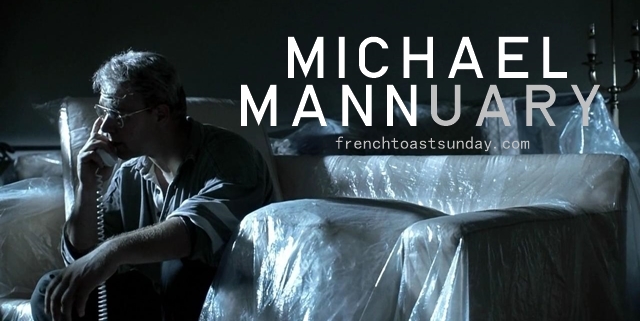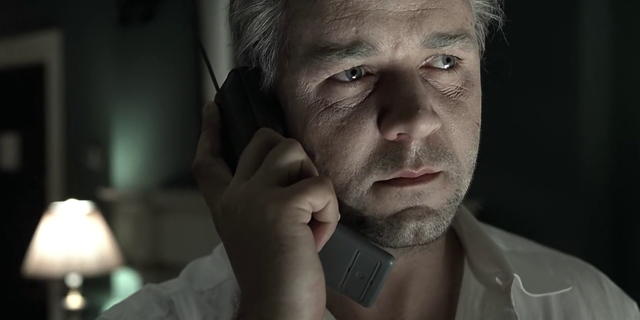 While Heat might be Michael Mann’s most prominent work, The Insider is easily his best regarded. It was nominated for seven Academy Awards, including Best Picture, Best Director, and Best Actor for Russell Crowe. I watched this for the first time in honor of Michael Mannuary and I was completely absorbed by this detailed, emotional retelling of a whistleblower and the producer who fought to have his story heard.
While Heat might be Michael Mann’s most prominent work, The Insider is easily his best regarded. It was nominated for seven Academy Awards, including Best Picture, Best Director, and Best Actor for Russell Crowe. I watched this for the first time in honor of Michael Mannuary and I was completely absorbed by this detailed, emotional retelling of a whistleblower and the producer who fought to have his story heard.
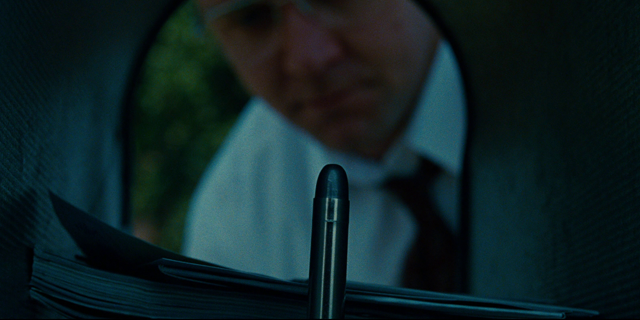
5. It’s riveting, taut, tense – all those great adjectives, and it’s about 60 Minutes: No doubt, 60 Minutes is perhaps the best known news program ever. However, it’s also that show where really old men talk about an issue and the subject matter may be compelling, but it’s still usually fairly dry. This movie makes 60 Minutes feel like the exact opposite. The Insider is about Jeffrey Wigand (Russell Crowe), a former vice president of research and development for a tobacco company who is approached by 60 Minutes producer Lowell Bergman (Al Pacino) to help him with a story about the tobacco industry. As you can imagine Wigand knows plenty of secrets that could seriously damage the entire industry, and some of the information might feel common sense (cigarettes are addictive and cause disease) but at this time it wasn’t on the record and was completely denied by industry leaders. Wigand was hesitant but ultimately willing to go on record with his knowledge despite a strict confidentiality agreement with his former employer and the death threats that ensued.
Where the story gets very compelling is how 60 Minutes was silenced by their own network to keep Wigand’s interview from airing. What follows is Bergman fighting to get the real news on television – sometimes alongside and sometimes against the famous correspondent Mike Wallace (Christopher Plummer), executive producer Don Hewitt (Philip Baker Hall), lawyers and higher up management. All the while, Wigand’s life is falling apart and he puts everything on the line, only for the threat of it all being for nothing. Everything feels so intense and immediate, and it’s all about a one hour segment that took a battle to come to air and changed the view of the tobacco industry irrefutably.
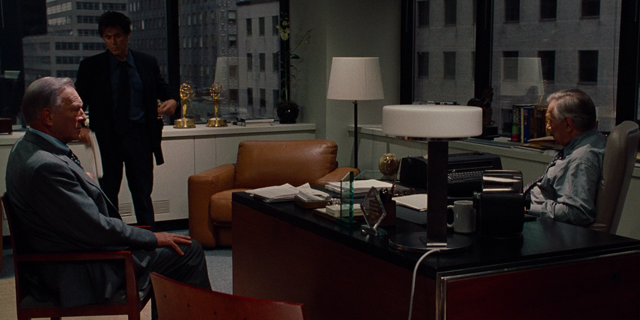
4. The behind the scenes of journalism: I have realized that one of my favorite things to watch on film is journalism, whether it’s the newspaper variety in All the President’s Men or the broadcast kind in Broadcast News. The Insider isn’t so much about this particular investigation (I mean it’s certainly important but the information here comes fairly easily), but the passion and the bureaucracy behind the scenes. From seeing the production team scheming to find a way for Wigand to circumvent his confidentiality agreement to watching the interview filming to Bergman editing the final segment to the conversations happening behind closed doors to try to stop the story from airing. It’s extremely fascinating to watch and to know that this fight to show true and vital news is so incredibly important. It’s inspiring to watch a man like Bergman (who has been recognized time and again with a Pulitzer prize, Emmys, Peabodys, etc) not give up on the mission of journalism and the dignity in his profession.
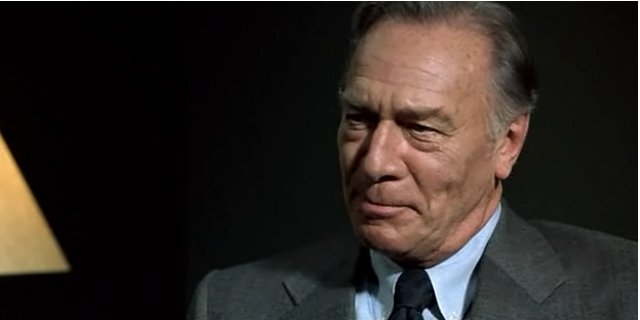
3. Christopher Plummer: What an actor! His role here is so rich and dynamic. We first see Mike Wallace preparing to interview the founder of a militant group in the Middle East, refusing to give in to Sheikh Fadlallah’s intimidating guards who keep telling him to push his chair further from the interview subject. Wallace at first seems arrogant in his refusal, but it actually feels like more of an indomitable professionalism that wants to show that he’s serious and not scared of the situation. He immediately hits the Sheikh with a hard accusation of terrorism.
Throughout the film you see these two sides to Wallace. The arrogance that comes with being such a successful and respected journalist. The determination to make a great and informative news show. At times he stands by Bergman and refuses to give into pressures to stop the story. Then when it becomes too threatening to his career he begins to fold. In one of the best scenes of the film he tells Bergman that this late in his career he has to worry about his legacy and fear that all the great work he’s done could be overshadowed by one huge fuck up. Plummer shows such sensitivity in this scene, opening up from his usual domineering self, revealing his doubt over giving up some journalistic integrity for his own reputation. He’s asking Bergman to still respect him.
His best scene though is when he’s all arrogance and domination. When Wallace is pissed off about the way an interview of his has been cut, the in house lawyer for CBS, Helen Caperelli (Gina Gershon), steps in to calm him down. She casually calls him “Mike” and Plummer delivers a shut down filled with condescension and rage. Plummer easily should have been nominated for Supporting Actor for this scene alone.
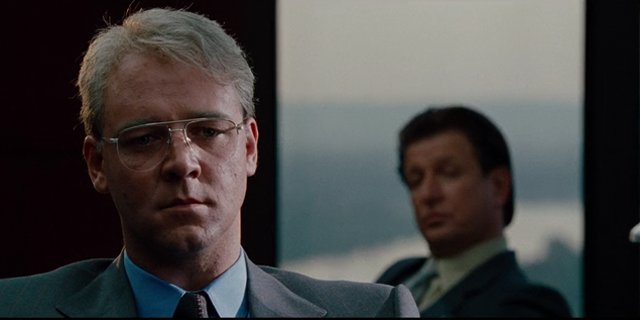
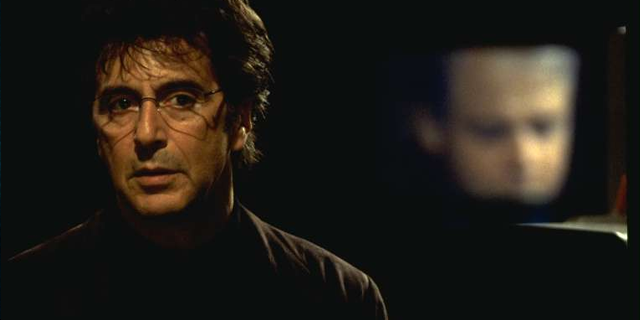
2. The complex relationship between Bergman and Wigand: Both of these men have such high stakes surrounding this story. Wigand puts himself and his family in a risky situation, not to mention breaking his confidentiality agreement by speaking to 60 Minutes. Bergman has his career on the line if he fights for the story to air but his integrity to risk if he doesn’t. Wigand is incredibly hesitant at first and we watch Bergman not only coax him to come forward as a source, but gives him the confidence that he’ll be protected if he does. When that struggles to come to fruition and Wigand’s life is thrown into turmoil, he begins to completely doubt his choice to believe in Bergman.
Russell Crowe and Al Pacino give such great performances here. This is one of Crowe’s string of Oscar nominations with Gladiator and A Beautiful Mind to follow in the consecutive years. His performance here is far more subtle than the next two. He seems so quiet and reserved, he’s a scientist and devoted father. At times though he’ll explode as scenes come to a head. It’s something that’s always stirring under the surface. Compared to his outrageous (in a great way) work in Heat, Pacino is very subdued here. He has his moments of intense passion where he might shout, but it’s not in the same bombastic way. Like Heat, he’s a man completely invested in his life’s work, but the characters are otherwise so different.
Together, these two men provide the two sides of the coin in this type of story. Unlike All the President’s Men where we only see Deep Throat in the shadows and the focus is on the reporters, we see our Deep Throat in detail in The Insider. Bergman is the journalist and producer trying to get the best sources for his story and is responsible for protecting them. Wigand is the source, feeling all the heat of the situation in the public eye but knowing his own responsibility as a scientist to share this important information to the public.
As Wigand says during his interview, I’m sure after all their struggles both men would agree:
If you asked me, would I do it again, do I think it’s worth it? Yeah, I think it’s worth it.
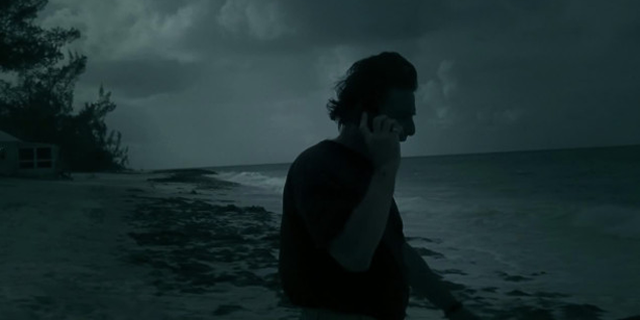
1. Michael Mann and Eric Roth’s screenplay: Mann’s direction is wonderful here, but the screenplay is what really stood out to me above everything. All of my other favorite things about The Insider can be credited to the words in the script. There are so many fantastic scenes featuring tense conversations, passionate outbursts, persuasive arguments, and desperate pleas. I don’t think there’s a wasted word in this script. Everything has such magnitude.
I could try to put into words why the screenplay is so fantastic, but wouldn’t it just be more effective to include one of my favorite parts here? If you’ve seen it, maybe it will remind you that this deserves a revisit, and if you haven’t, you probably should get on it. Here is an impassioned moment from Bergman during a meeting with Wallace and their executive producer:
You pay me to go get guys like Wigand, to draw him out. To get him to trust us, to get him to go on television. I do. I deliver him. He sits. He talks. He violates his own fucking confidentiality agreement. And he’s only the key witness in the biggest public health reform issue, maybe the biggest, most-expensive corporate-malfeasance case in U.S. history. And Jeffrey Wigand, who’s out on a limb, does he go on television and tell the truth? Yes. Is it newsworthy? Yes. Are we gonna air it? Of course not. Why? Because he’s not telling the truth? No. Because he is telling the truth. That’s why we’re not going to air it. And the more truth he tells, the worse it gets!

